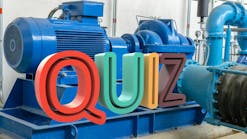Motors drive everything from centrifugal pumps and compressors to mixers, conveyors and reactor agitators. They convert electrical energy into the mechanical power needed for fluid transport, heat transfer, mass transfer operations and precise process control. Motor selection directly impacts energy efficiency, operational reliability and safety—with incorrect sizing or type leading to costly downtime, excessive energy consumption or equipment failure. Understanding motor characteristics, from variable frequency drives to explosion-proof designs, is essential for optimizing process performance and maintaining safe, economical operations in hazardous chemical environments. Test your knowledge of motors now.
And if you need to buff up your motor skills, here are a few articles:
- DON’T PANIC – Tighten Up Equipment Orders
International equipment procurement requires careful motor speed and power verification. - Motor Efficiency Turns Upward
Regulation and end-user desires are spurring improvements. - Don’t Get Blown Away By Air Motors
Compressed air technology isn’t the most energy efficient source of power. - Energy Saver: Variable Speed Drives Boost Chemical Plant Efficiency
VSDs deliver up to 50% energy savings in chemical manufacturing while laying the groundwork for smart factory operations.
